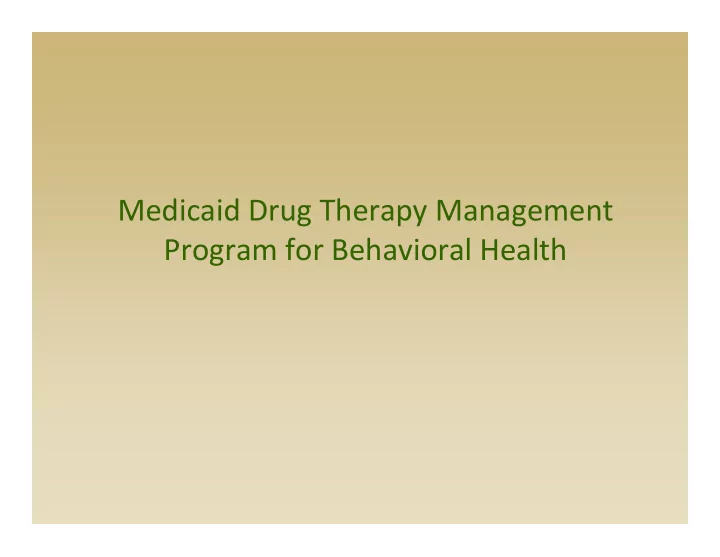

Medicaid Drug Therapy Management Program for Behavioral Health
Presentation Objectives • Describe the goals of the Program as established by the Florida Legislature • Describe the major activities of the Program • Discuss ways the Program could provide assistance to DCF in managing the use of psychotherapeutic medications by children in the child welfare system
Conducted by FMHI at USF Under a Contract with the AHCA
Program Goals Ch. 409.912(39) (a) (10) • Improve the quality of care and behavioral health drug prescribing practices based on best practices guidelines • Improve patient adherence to medication plans • Reduce clinical risk • Lower prescribed drug costs
Program Activities Guideline development ▼ Complex care indicators ▼ Analysis of claims for mental health Rx ▼ Intervention with MDs ▼ Ongoing surveillance and follow-up ▼ Re-measurement
Best Practice Medication Treatment Guidelines
Why Use Best Practice Guidelines? • They are based on ALL the research on the comprehensive benefits and risks of different medication strategies • They provide guidance to clinicians • They can be helpful in keeping busy clinicians abreast of new information that may improve care and outcomes
Guideline Development Strategy • National experts • Participation of Florida’s medical communities including MDs in academic, private practice and public agency settings • Review of relevant research and evidence • Two ‐ three day process • Consensus recommendations
Guideline Features • Recommend comprehensive evaluation before medication • State that medications are at best one of several treatment strategies • Recommend more evidence based treatment strategies before less evidence based strategies • Organized into levels. As the level of the recommendation increases the amount of evidence supporting the practice decreases • Physicians may begin care at any level based on the patients condition and history
Child and Adolescent Guidelines • ADHD in Children Under Age 6 (updated 11/17/2008) • ADHD in Children and Adolescents Age 6 and up (updated 11/17/2008) • Bipolar I – Acute or Mixed Mania in Children and Adolescents Age 6 – 17 Years Old (updated 11/17/2008) • Chronic Impulsive Aggression in Child and Adolescent Psychiatric Disorders Age 6 ‐ 17 Years Old (updated 11/17/2008) • Disruptive Behavior Disorder or Severe Aggression in Children under Age 6 (updated 11/17/2008 )
Child and Adolescent Guidelines • Dosing Recommendations Regarding the Use of Antipsychotic Medication in Children under 6 Years of Age (updated 11/17/2008) • Major Depression in Children Under Age 6 (updated 11/17/2008) • Major Depression in Adolescents (updated 11/17/2008) • Principles of Practice Regarding the Use of Psychotropic Medication under Age 6 (updated 11/17/2008) • New high dosing tables for children (Posted 11/17/2008)
MD Education and Guideline Dissemination • Medical societies and provider trade associations • Lectures, discussion groups, CME’s • Medical staff meetings • Program website • www.flmedicaidbh.fmhi.usf.edu • Website links
Complex Care Indicators (CCI)
What are Complex Care Indicators ? • Data filters derived from the guidelines and recommended by the expert panel • Practices that are – Less well supported by evidence and/or – May produce marginal benefit and/or increased risk • Generally to be used only after better supported approaches have failed to produce the desired benefits • Should therefore be relatively unusual • Warrant greater review or scrutiny
Prescriptions That Trigger CCI May Be Appropriate Depending on the treatment complexities they may be: ○ the most beneficial and least risky strategy for a particular patient ○ represent a well informed choice of the MD, family and child
Complex Care Indicators • Three or more antidepressants for 60 or more days • Use of a high dose of antipsychotic • Concurrent use of 2 or more antipsychotics > 60 days • Concurrent use of 3 or more antipsychotics for more than 60 days
Complex Care Indicators • Use of an antipsychotic children under 6 years old • Use of an antidepressant children under 6 years old • Use of a stimulant children under 5 years old • Concurrent use of antidepressant, stimulant and antipsychotic for more than 60 days
Analysis of Pharmacy Claims Using Complex Care Indicators
Process and Output of Analyses • Quarterly retrospective analysis of pharmacy claims • Identification of patients whose prescriptions trigger a complex care indicator and the associated prescriber • Identification of physicians whose prescriptions frequently trigger the complex care indicators
Interventions with Physicians
Intervention Strategies • Mailings • Academic detailing contacts • Reviews of medical records • Expert consultation
Assumptions Behind Interventions • The prescribing of any medication involves weighing of the potential benefits and risks associated with its use • Prescribers will consider change in medication strategies based on information about greater potential benefit and/or less risk for their patients • Focusing on MDs whose Rx trigger comparatively large numbers of CCI offers the greatest potential for increasing evidence based prescribing
Outcomes of Interventions • Better informed prescribers • Review of prescriptions that trigger complex care indicators based on information provided through the intervention. • Change in medication strategy only if the physician in collaboration with the patient and family decide a change may increase benefit and/or reduce risk
Program Assistance to DCF
Educational Strategies • Dissemination of information about the Program to DCF staff, the judiciary and child advocates • Presentations about the evidence based guidelines and complex care indicators to MDs who often treat children in the child welfare system as well as to those involved in their care
Analysis and Reports • Numbers of children in different DCF child welfare categories who received different classes of psychotherapeutic medication during each quarter • Identification of children whose prescriptions trigger complex care indicators and their associated physicians • Identification of children who have multiple prescribers of psychotherapeutic medications • Quarterly tracking of the prescriptions of children whose prescriptions trigger complex care indicators
The MDTMP Can Provide Useful Support to a DCF Medication Management Initiative
Recommend
More recommend